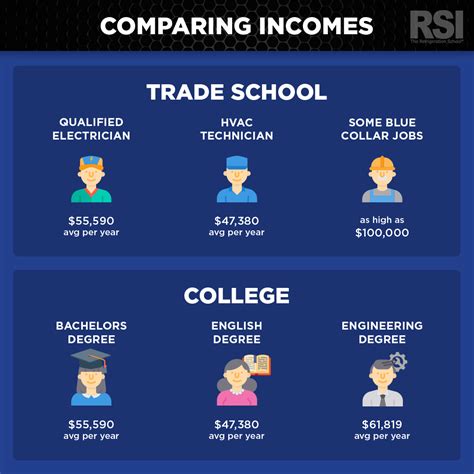Traditionally, college has been seen as the primary pathway to a successful career. However, in recent years, trade schools have gained significant popularity as an alternative route to obtaining well-paying jobs.

Why Trade Schools?
Trade schools offer a number of advantages over traditional college programs.
- Shorter Duration: Trade school programs typically take one to two years to complete, compared to four years for a bachelor’s degree. This means you can enter the workforce sooner and start earning a salary.
- Lower Cost: Trade schools are generally more affordable than traditional colleges, as they do not require students to take general education courses or pay for room and board.
- Hands-On Training: Trade schools emphasize hands-on training, which provides students with the practical skills necessary to succeed in their chosen field.
- High Demand: There is a high demand for skilled trade workers, such as electricians, plumbers, and HVAC technicians. This means graduates of trade schools have excellent job prospects.
Salary Expectations
The salary you can expect to earn after graduating from trade school depends on a number of factors, including your chosen field, your experience, and your location.
According to the Bureau of Labor Statistics (BLS), the median annual salary for all workers with a trade school certificate is $56,380.
However, salaries can vary significantly depending on the specific trade.
Here are some examples of median annual salaries for different trade school occupations:
| Occupation | Median Annual Salary |
|---|---|
| Electrician | $56,900 |
| Plumber | $56,330 |
| HVAC Technician | $48,730 |
| Welder | $44,190 |
| Carpenter | $46,680 |
These salaries are comparable to those of workers with a bachelor’s degree in many fields.
Pain Points
While trade schools offer a number of benefits, there are also some potential pain points to consider.
- Limited Career Advancement Opportunities: Trade school graduates may have limited opportunities for career advancement compared to those with a bachelor’s degree.
- Physical Demands: Some trade jobs can be physically demanding and may require workers to work in uncomfortable or dangerous conditions.
- Job Security: Trade jobs can be affected by economic downturns, which can lead to layoffs.
Motivations
Despite these potential pain points, many people are motivated to attend trade school for a variety of reasons.
- Job Security: Trade jobs are in high demand, which provides a sense of job security.
- Earning Potential: Trade school graduates can earn high salaries, even without a bachelor’s degree.
- Hands-On Work: Trade jobs offer the opportunity to work with your hands and create tangible results.
- Personal Satisfaction: Trade school graduates often find great personal satisfaction in their work, as they are able to make a positive impact on their communities.
Strategies for Success
If you are considering attending trade school, there are a number of strategies you can follow to increase your chances of success.
- Research Different Trade Schools: There are many different trade schools out there, so it is important to do your research and find one that offers the program you want and has a good reputation.
- Choose a Trade You Are Interested In: You are more likely to succeed in a trade that you are passionate about.
- Be Prepared to Work Hard: Trade school can be challenging, so it is important to be prepared to work hard and dedicate yourself to your studies.
- Network with Other Students: Make an effort to network with other students in your trade school program. They can provide support and help you learn new skills.
- Get Experience: Get as much experience as you can while you are in school. This can include internships, apprenticeships, or volunteer work.
Tips and Tricks
Here are a few tips and tricks to help you make the most of your trade school experience:
- Attend Class Regularly: Attendance is important for success in trade school.
- Take Good Notes: Take good notes during class so that you can review the material later.
- Study Regularly: Study regularly outside of class to reinforce what you have learned.
- Ask for Help When You Need It: Don’t be afraid to ask your instructor or classmates for help when you need it.
- Get Involved in Extracurricular Activities: Extracurricular activities can help you develop leadership skills and network with other students.
Conclusion
Trade schools offer a number of advantages over traditional college programs, including shorter duration, lower cost, hands-on training, and high demand.
While there are some potential pain points to consider, such as limited career advancement opportunities, physical demands, and job security, many people are motivated to attend trade school for reasons such as job security, earning potential, hands-on work, and personal satisfaction.
If you are considering attending trade school, there are a number of strategies you can follow to increase your chances of success, such as researching different trade schools, choosing a trade you are interested in, being prepared to work hard, networking with other students, and getting experience.
